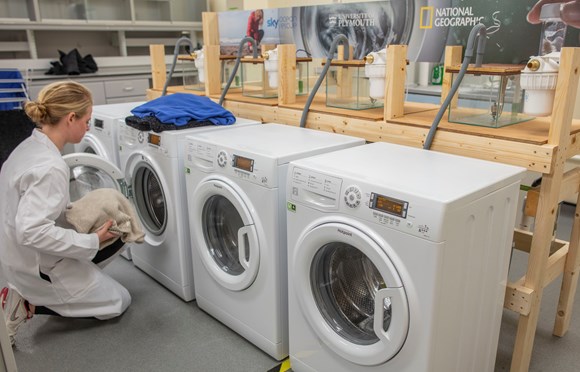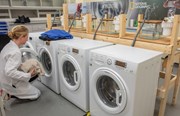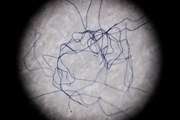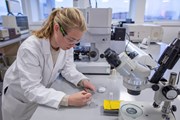
16 July 2020, 09:30
Study shows devices can reduce fibres released in laundry cycle by up to 80%

Using fibre-catching devices as part of the laundry process can dramatically reduce the amount of microscopic particles potentially entering the marine environment, according to new research.
A study conducted at the University of Plymouth compared the efficiency of six different devices, ranging from prototypes to commercially available products.
The most successful reduced the amount of fibres released into wastewater by almost 80%, suggesting there is considerable potential for them to have environmental benefits.
However, writing in Science of the Total Environment, researchers from the University’s International Marine Litter Research Unit say they will only ever be part of any solution.
A recent study at the University showed normal wear and tear when wearing clothes is just as significant a source of microplastics as release from laundering, while a report produced for Defra in May 2020 highlighted that fitting filters to washing machines could be less effective than changing fabric designs to reduce fibre loss.
As such, the current study’s authors say there is an ongoing need for scientists to collaborate with industry and policy makers to ensure improvements are made right from the design phase through to how clothes are washed.
The study was funded by the National Geographic Society and Sky Ocean Rescue. Research Fellow and National Geographic Explorer Dr Imogen Napper, a Sky Ocean Rescue Scholar and the study’s lead author, said: “Fibres from clothing are among the key sources of microplastics, and companies are inventing ways which claim to reduce the amount of fibres which enter wastewater. We wanted to see how effective they were both in catching fibres, but also stopping clothes from shedding them in the first place. Our results show there is a huge variety between the devices available, with some significantly reducing the number of fibres released.”
For the research, scientists washed three different synthetic fabric types (100% polyester, 100% acrylic, and a 60% polyester/40% cotton blend) to represent a typical mixed load.
They used a mesh to capture fibres entering wastewater, measuring the mass of particles generated without filters and then with three in-drum devices and three external washing machine filters.
The results showed the most effective device reduced the quantity of microfibres being released by 78%, while the least effective analysed in this particular study reducing it by 21%.
Professor Richard Thompson OBE, Head of the International Marine Litter Research Unit, was co- author on the study. In recent years, he has given evidence to both the UK Government’s Sustainability of the Fashion Industry inquiry and the recent OECD Forum on due diligence in the garment and footwear sector. He added: “Too often, the quest for fast fashion and market pressures means that appropriate environmental considerations are being sacrificed. If we are to achieve widespread and lasting change, it is essential for scientists to provide the independent evidence that demonstrates the scale of the problem as well as any potential solutions. Some of the devices we tested can undoubtedly reduce the fibres generated through the laundry process, but perhaps the most overarching change would be to design garments to last longer and shed less fibres in the first place.”
The University of Plymouth was recently presented with the Queen’s Anniversary Prize for Higher and Further Education for its pioneering research into microplastics pollution and its policy impact in the UK and globally.
The study has also been welcomed by the Marine Conservation Society, which recently launched its own Stop Ocean Threads campaign. Dr Laura Foster, Head of Clean Seas at the charity, said: "This independent research shows clearly that washing machine fitted filters are the most effective method of preventing microfibre loss from washing clothes. We’re urging people to sign our petition which will require the filters, by law, in all washing machines from 2024. Having all washing machines fitted with filters will make a huge impact on the volume of microfibres polluting our ocean from every wash. The clothes we have will continue to shed fibres now and in the many years to come, which means that we need to have filters fitted as well as improvements from the fashion industry."
Contact Information
Alan Williams
alan.williams@plymouth.ac.uk
Notes to editors
The full study – Napper et al: The efficiency of devices intended to reduce microfibre release during clothes washing – is published in Science of the Total Environment, DOI: 10.1016/j.scitotenv.2020.140412.
The study was carried out in a purpose-built laboratory built at the University by technician Aaron Barrett. Tests were conducted in 2018 and based on devices that were either in prototype, or commercially available, at that time.
Through solutions-focused grants, the National Geographic Society is supporting individuals working to reduce plastic pollution at the source, both by reducing individual plastic consumption and reducing the flow of plastics into watersheds.
About the University of Plymouth
The University of Plymouth is renowned for high quality, internationally-leading education, research and innovation.
With a mission to Advance Knowledge and Transform Lives, Plymouth is a *top 50 research university with clusters of world class research across a wide range of disciplines including marine science and engineering, medicine, cybersecurity and psychology. A three-time winner of the Queen’s Anniversary Prize for Higher and Further Education, most recently in 2020 in respect of its pioneering research on microplastics pollution in the oceans and its impact on the environment and changing behaviour, the University continues to grow in stature and reputation.
It has a strong track record for teaching and learning excellence, and has one of the highest numbers of National Teaching Fellows of any UK university. With over 19,000 students, and a further 9,500 studying for a Plymouth degree at partner institutions in the UK and around the world, and over 135,000 alumni pursuing their chosen careers globally, it has a growing global presence.
* Research Fortnight Research Power League Table 2014.



